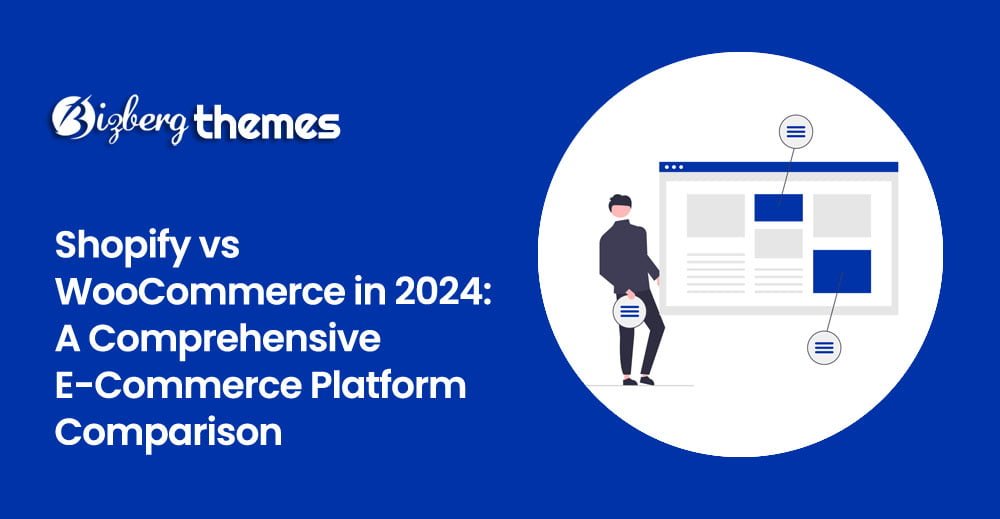
Are you navigating the world of e-commerce and deciding between Shopify and WooCommerce for your online store? In this comprehensive comparison review, we’ll delve into the key aspects of both platforms to help you make an informed decision. Whether you’re setting up a new store or contemplating a platform switch, below points will provide you with valuable insights.
- Platform Usability:
- Shopify offers a user-friendly interface with an intuitive setup process, ideal for those with limited coding knowledge.
- WooCommerce, a WordPress plugin, provides more control over customization but comes with a learning curve, requiring users to manage security, hosting, and updates.
- Scalability:
- Shopify handles businesses of all sizes effortlessly, providing features like inventory management, secure payment gateways, and a wide range of extensions for enhanced functionality.
- WooCommerce’s scalability depends on the hosting provider chosen, offering endless customization options but may incur higher hosting costs, making it less budget-friendly than Shopify.
- Themes and Designs:
- Shopify offers 70 professional design themes optimized for mobile devices, providing a seamless shopping experience.
- WooCommerce provides thousands of WordPress themes, customizable to your requirements, but not all are designed with e-commerce in mind, requiring careful selection.
- Customer Support:
- Shopify boasts 24/7 customer support via email, live chat, and phone for all plans, ensuring responsive and helpful assistance.
- WooCommerce’s support options vary based on hosting providers or plugins, but its active community offers forums, documentation, and tutorials for issue resolution.
- Drop Shipping Integration:
- Shopify offers multiple popular vendors with varying costs, while WooCommerce provides hundreds of options, allowing for tailored selections based on business needs.
- Pricing:
- Shopify offers a three-day trial period, with plans starting from $19 per month and going up to $299 per month, covering security, hosting, and support.
- WooCommerce is a free plugin, but costs include domain registration, hosting, and premium themes or extensions, with expenses varying based on individual feature preferences.
- Payment Options:
- Shopify supports various payment options, including its own Shopify Payments, third-party options, with a note that an extra 2% is charged on each transaction for some plans.
- WooCommerce offers default options like Stripe and PayPal, along with additional gateways, with transaction fees determined by your bank or payment gateways.
Conclusion:
Choosing the right e-commerce platform for your online store is a pivotal decision that directly impacts your business’s success. In this in-depth comparison between Shopify and WooCommerce, we’ve explored key factors such as usability, scalability, design options, customer support, drop shipping integration, pricing, and payment choices. Your ultimate choice depends on your unique requirements, technical proficiency, and budget constraints. Shopify excels in user-friendliness, scalability, and support, while WooCommerce offers unparalleled customization options. Whether you prioritize convenience or flexibility, this review aims to equip you with the insights needed to make an informed decision. Remember, the success of your online venture hinges on selecting the platform that aligns seamlessly with your business goals.
FAQs:
Q: Which platform is better for beginners with minimal coding knowledge?
- A: Shopify is recommended for beginners, offering a user-friendly interface and a hosted solution that eliminates the need to manage technical aspects such as security and hosting.
Q: Can WooCommerce handle large-scale e-commerce operations effectively?
- A: Yes, WooCommerce can scale, but it relies on the hosting provider’s power. Shopify, being a hosted platform, is often considered more suitable for handling high-volume sales effortlessly.
Q: Are there differences in theme customization options between Shopify and WooCommerce?
- A: Both platforms allow theme customization, with Shopify offering 70 professional design themes optimized for mobile, while WooCommerce provides thousands of WordPress themes, requiring careful selection.
Q: What are the cost implications of using WooCommerce compared to Shopify?
- A: WooCommerce is a free plugin, but costs include domain registration, hosting, and any premium themes or extensions. Costs vary based on individual feature preferences, making it a flexible but potentially less budget-friendly option than Shopify.
Q: Which platform provides better customer support options?
- A: Shopify stands out in customer support, offering 24/7 assistance via email, live chat, and phone for all plans. WooCommerce’s support varies based on hosting or plugins, but its active community provides forums and documentation for issue resolution.
